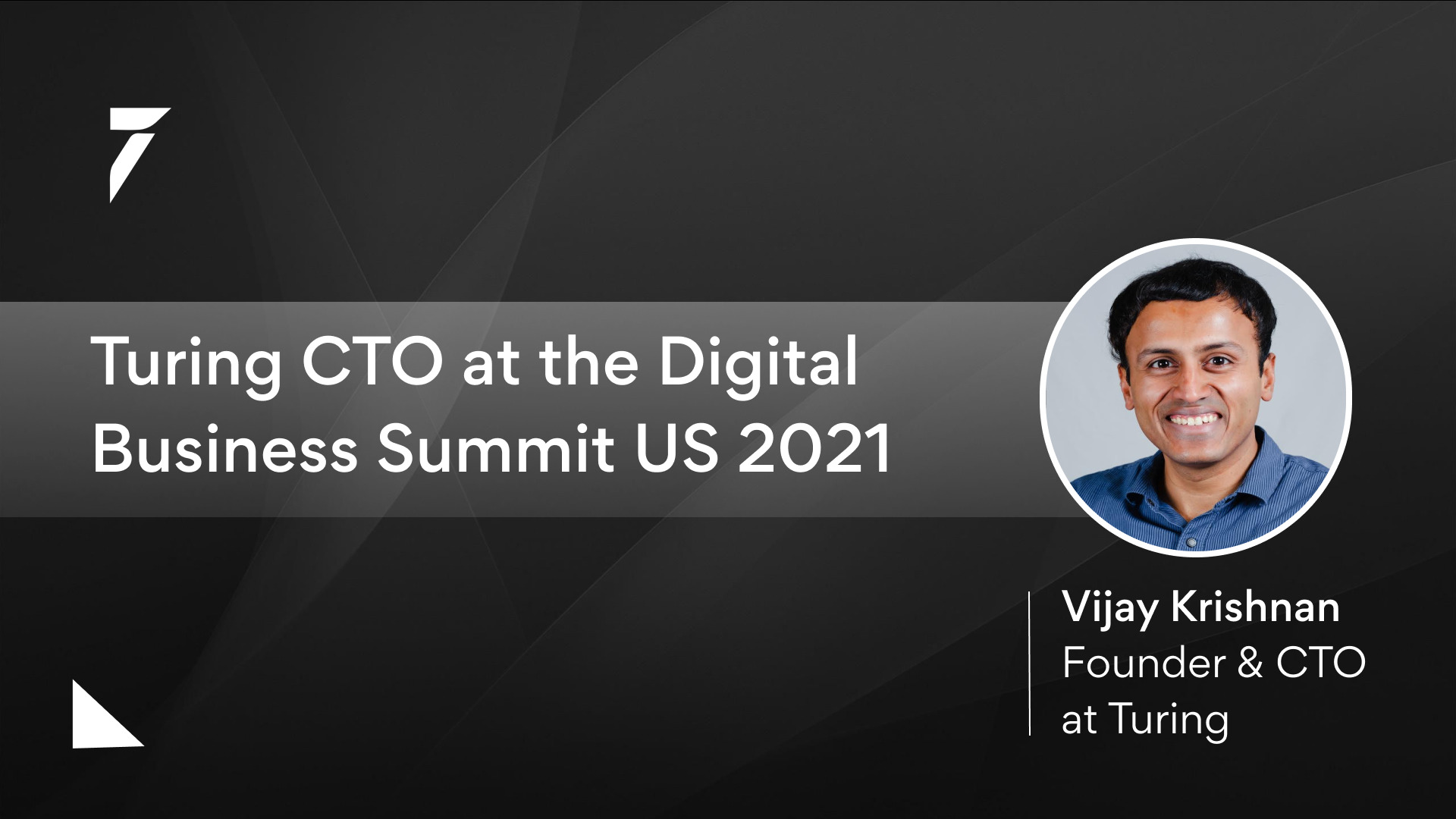Turing CTO at the Digital Business Summit 2021
The Digital Business Summit 2021 brought together industry experts and enabled people to adopt innovative technologies to elevate their enterprise and keep them competitive. This post summarizes the insights shared in the summit by Turing.com co-founder and CTO Vijay Krishnan and explains why enterprises should incorporate an Intelligent Talent Cloud into their digital workplace.
Here are the key takeaways:
Companies should be open to experimentation
Krishnan stated that it was high time enterprises acknowledged the uncertainty around them. He also added that companies should attempt to figure out how to hire developers from across the globe.
“The best way to move forward [in this world] is to be open to a certain degree of wild experimentation. And what do I mean by experimentation? I mean being open to a global talent pool. So this change will be very valuable for companies,” Krishnan said.
Talking about the cloud, he said: “The other kind of experiment I would encourage is to work with companies in the talent cloud space. Try working with them at least on a few different roles and see how it works out and, over time, build some better understanding about the space.”
New talent pockets are springing up everywhere
Krishnan explained that the driving factors behind the rise of new talent pockets are technology advancement, internet penetration, and democratization of computer science education or software engineering training.
“We live in a very different era now. When I was back in college, I had to read the barely readable Linux manual for my programming assignments. Now there’s StackOverflow and things that have a low entry bar. Earlier, you could not reach a certain skill level unless you went to a good school. Now, internet penetration, economic growth, and democratization of education have changed the entire scenario. And thus, a lot of solid software developers have started springing up worldwide,” added the CTO.
Krishnan also added that the more companies open to talent from all over the world, the more competitive advantage they’ll have.
Define your hiring and recruiting strategy and processes

Optimize Hiring Strategy
The AI enthusiast suggested that companies should work on a recruiting strategy that does not suck up their engineering leadership’s time. He shared the following tips for the same:
-
Use assessment tools
Krishnan said that companies could use tools that nudge people toward taking various programming tests. They could also consider offline testing options. -
Build a marketing machine
“A marketing machine attracts people to your company. [Without one] there’s a significant risk that the best candidates will not end up taking your test, and you end up getting an adverse selection,” explained Krishnan. -
Fast-track resume screening process
An efficient resume screening process is essential for every recruiter. “If you get some exceptionally talented developers, you want to put them through the fast-track process instead of risking losing them,” said the CTO.
Figure out remote management and collaboration
Further, into the session, Krishnan explained that sourcing, vetting, and hiring great talent is the first step of making [a] remote [setup] work. “If you want to take full advantage of the remote setup and unleash the full potential of this new reality we live in, you need to figure out how to manage and collaborate with remote workers,” he added.
-
Maintain a four-hour overlap
According to Krishnan, a four-hour overlap is pretty much non-negotiable. Without one, collaboration becomes unsustainable.
“Empirically, this four-hour overlap has been very rewarding. When you reduce it to one or two hours, your collaboration starts going sideways. When you increase it to six or seven hours, collaboration can become punishingly tricky for your developers. So this [four hours overlap] turns out to be a nice balance,” he noted.
Krishnan also added that employers should be upfront about the timezone overlap condition with the candidates. “It is not a good idea to hire people with expectations and then try to make them do something very different that they never signed up for,” he stated. -
Extensive use of video and daily stand-ups
“I’ve seen many companies overlook video communication. I cannot overstate how powerful video has been [for us.] Along with this, it is crucial to nudge your developers towards written communication,” said Krishnan.
He added that Turing encouraged its developers to do a daily virtual stand-up and write a short about what they’ve been up to during the week, etc. “This practice helps maintain transparency in the organization’s operations,” Krishnan explained.
ML and the rise of the Intelligent Talent Cloud

Rise of Intelligent Talent Cloud
The Turing CTO explained that [the use of] AI will be an enduring competitive advantage for companies.
“When you expose yourself to the world’s global talent pool, AI presents a huge opportunity. For example, on Turing, for any typical job, there are around 10,000 developers that might be a fit for the role. Now, who are the best three or five people for the job out of this giant pool? [With ML], it is possible to go a lot closer to a perfect fit for a given job. So, ML plays a massive role in doing this kind of detailed matching,” added Krishnan.
He also mentioned that a talent cloud should be able to vet people in an information-efficient way and handle effective collaboration. Moreover, it should also take care of labor compliance, payments, and things like that across various countries.
“Simply put, intelligent matching is based on the understanding that every company and manager is different,” Krishnan said.
Consider the scalability of the talent cloud.
“When talking about large enterprises, it is important to think about whether a certain talent partner can actually scale. Do they have a sufficiently large talent pool? Is there a possibility you’d be able to grow to 100s or even 1000s of software developers hired through them?” Krishnan observed.
This large talent pool allows companies to do speed and volume simultaneously.
To sum up
Krishnan concluded that the talent cloud is a cheap experiment that all companies should try out.
“I would highly encourage companies to try multiple [talent cloud] providers. You may try hiring one developer, and if that developer doesn’t work out fine, you can always stop that engagement. But if it works out, it could teach you a lot of new stuff. You could scale to many hundreds of developers, and the talent cloud could be a game-changer for you,” he signed off.
Are you an organization looking to build your remote software engineering team? Try Turing.
Turing’s Intelligent Talent Cloud helps companies spin up their engineering dream teams in just a matter of days. Visit our Hire page to know more!
Tell us the skills you need and we'll find the best developer for you in days, not weeks.












